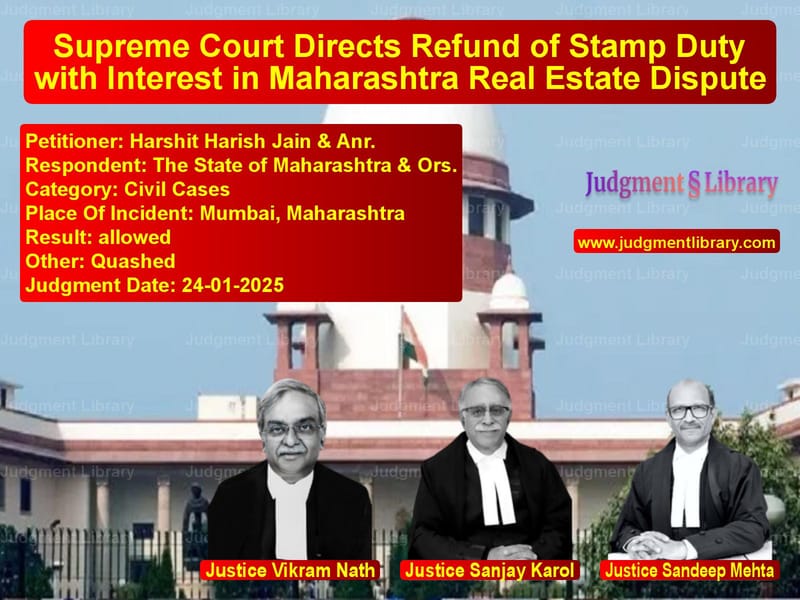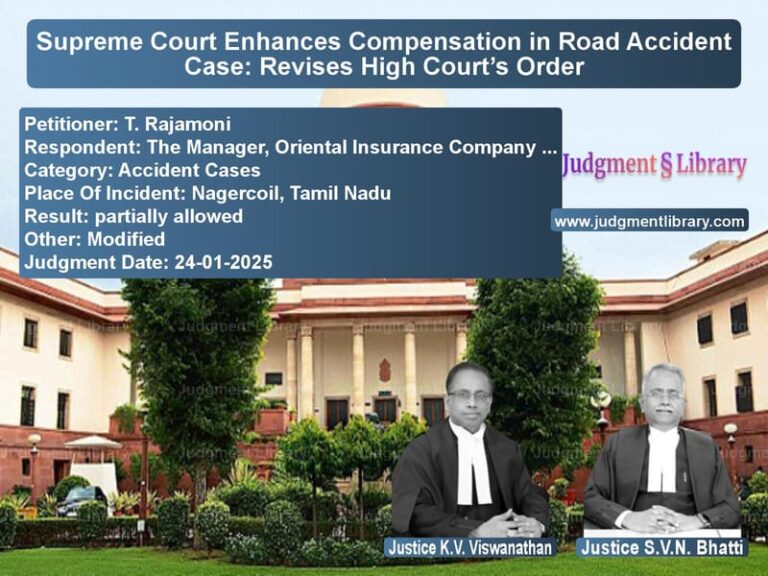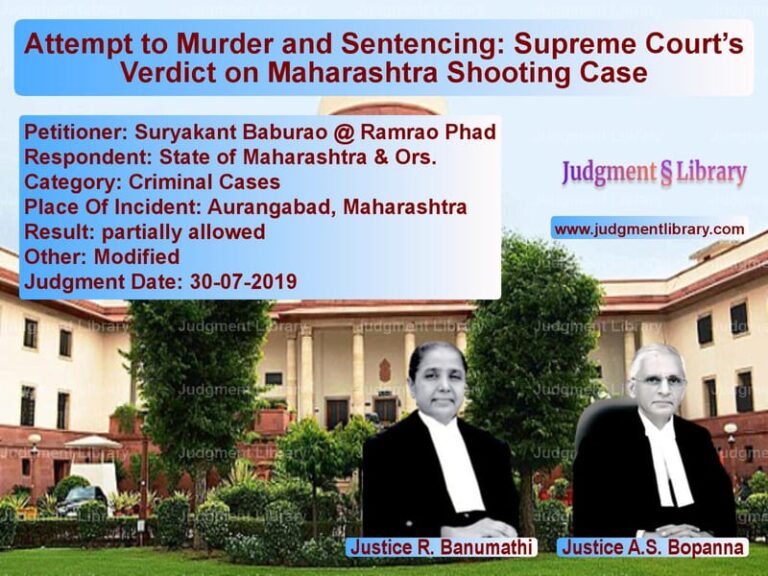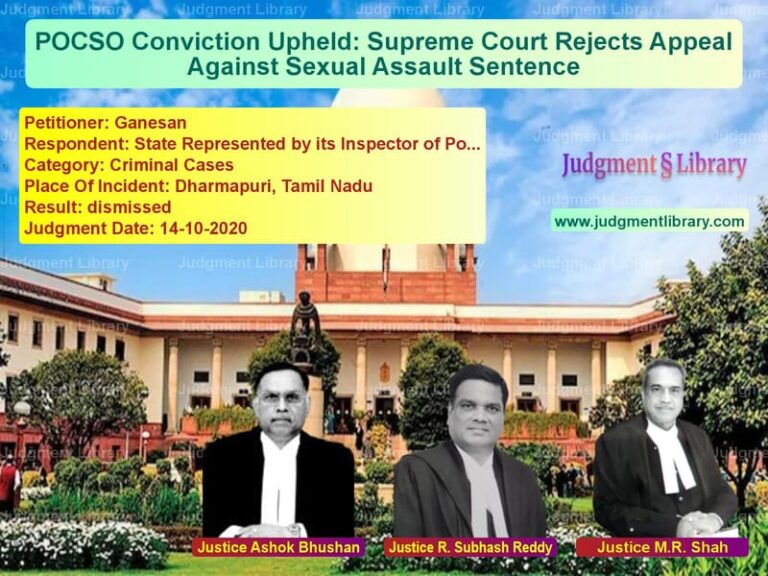Supreme Court Directs Refund of Stamp Duty with Interest in Maharashtra Real Estate Dispute
The Supreme Court of India in Harshit Harish Jain & Anr. v. The State of Maharashtra & Ors. delivered a significant judgment regarding the refund of stamp duty under the Maharashtra Stamp Act, 1958. The Court ruled in favor of the appellants, setting aside the Bombay High Court’s decision that denied their refund claim on the grounds of limitation.
Background of the Case
The appellants entered into an Agreement to Sell dated August 30, 2014, with a real estate developer, M/s. Krona Realties Pvt. Ltd., for purchasing a residential flat in the ‘Lodha Venezia’ project in Mumbai. The total price was ₹5.46 crores, and they paid an advance of ₹1.08 crores. In compliance with the Maharashtra Stamp Act, they also paid stamp duty of ₹27,34,500 and a registration fee of ₹30,000.
However, due to unexpected delays in project completion linked to encroachment and litigation regarding adjacent slums, the developer was unable to deliver possession by the agreed date of March 31, 2017. On March 17, 2015, the appellants opted to cancel the booking and executed a Deed of Cancellation. This deed was officially registered on April 28, 2015. A further Deed of Rectification was executed on May 23, 2016, clarifying refund-related details.
Legal Dispute Over Stamp Duty Refund
- Initially, under Section 48(1) of the Maharashtra Stamp Act, a two-year limitation period applied for claiming a refund of stamp duty in case of a canceled agreement.
- On April 24, 2015, an amendment reduced this refund claim period from two years to six months.
- The appellants filed a refund application on August 6, 2016, contending that the two-year window applied since their cancellation deed was executed before the amendment.
- The Chief Controlling Revenue Authority (CCRA), Pune, initially allowed the refund on January 8, 2018, but later reversed its decision on March 3, 2018, citing the six-month limitation.
The appellants challenged the CCRA’s reversal through administrative appeals and later through Writ Petition No. 8276 of 2019 in the Bombay High Court. The High Court ruled against them, holding that since the registration date of April 28, 2015, fell after the amendment, the six-month limitation applied.
Arguments by the Appellants
- The right to claim a refund arose at the time of execution of the cancellation deed (March 17, 2015), and not upon its registration.
- The retrospective application of the amendment would unfairly affect vested rights.
- The CCRA had no power to review and recall its initial approval of the refund.
- Denial of refund on technical grounds of limitation, despite compliance, would be unjust.
Arguments by the Respondents
- The Maharashtra government defended the rejection of the refund, arguing that legal amendments should govern claims at the time of submission, not execution.
- The new six-month limitation was applied correctly since the registration date was post-amendment.
- The CCRA’s decision was within its administrative powers.
Supreme Court’s Observations
- “The right to seek a refund accrues when the cancellation deed is executed, not when it is registered.”
- “A limitation amendment that retrospectively shortens a legal right must be applied cautiously to avoid defeating valid claims.”
- “The CCRA lacked any statutory authority to review and recall its own order approving the refund.”
- “Denying the refund on technical grounds, when the applicants acted in good faith, goes against principles of fairness.”
- “The High Court erred in giving undue weight to the registration date while ignoring vested rights of the appellants.”
Final Judgment
- The Supreme Court set aside the Bombay High Court’s order and restored the appellants’ right to claim a refund under the original two-year limitation period.
- The March 3, 2018, order recalling the refund was quashed.
- The State of Maharashtra was directed to process and disburse the refund of ₹27,34,500 within four weeks.
- An interest of 6% per annum was granted on the refund amount from January 8, 2018, to the date of payment.
- Any further delay would invite an increased interest rate of 12% per annum.
Conclusion
The Supreme Court’s decision ensures that refund claims are governed by the law applicable at the time the right accrues, not arbitrary procedural dates. This judgment upholds fairness in taxation matters, preventing undue financial loss to homebuyers affected by project delays.
Read also: https://judgmentlibrary.com/supreme-court-denies-condonation-of-2422-day-delay-in-property-appeal/
Petitioner Name: Harshit Harish Jain & Anr..Respondent Name: The State of Maharashtra & Ors..Judgment By: Justice Vikram Nath, Justice Sanjay Karol, Justice Sandeep Mehta.Place Of Incident: Mumbai, Maharashtra.Judgment Date: 24-01-2025.
Don’t miss out on the full details! Download the complete judgment in PDF format below and gain valuable insights instantly!
Download Judgment: harshit-harish-jain-vs-the-state-of-maharas-supreme-court-of-india-judgment-dated-24-01-2025.pdf
Directly Download Judgment: Directly download this Judgment
See all petitions in Damages and Compensation
See all petitions in Contract Disputes
See all petitions in Property Disputes
See all petitions in Judgment by Vikram Nath
See all petitions in Judgment by Sanjay Karol
See all petitions in Judgment by Sandeep Mehta
See all petitions in allowed
See all petitions in Quashed
See all petitions in supreme court of India judgments January 2025
See all petitions in 2025 judgments
See all posts in Civil Cases Category
See all allowed petitions in Civil Cases Category
See all Dismissed petitions in Civil Cases Category
See all partially allowed petitions in Civil Cases Category







